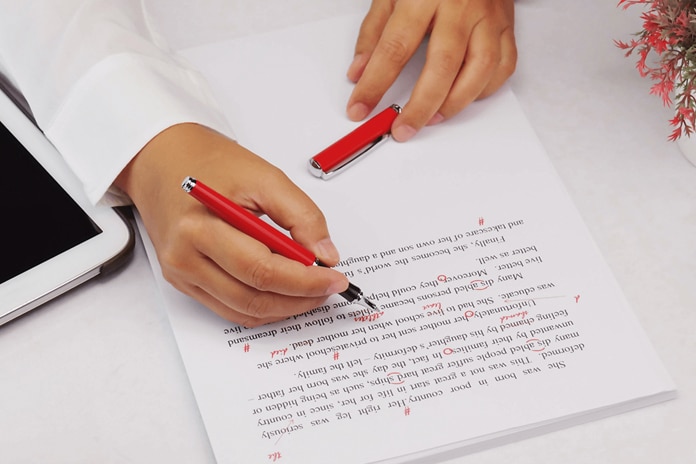In the world of writing, you often see "proofreading" and "editing" used more or less interchangeably. Are they the same, though, or are there differences?
The truth is, proofreading and editing are very different services, performed at different points in a project, with different goals and different degrees of depth.
So, let's talk about them!
 Proofreading is a thorough review of a piece of content, typically after it is in a "final draft" state but before it is published. This proofreading is heavily focused on technical issues. You can think of it as a final polishing pass on a piece before it is submitted to a journal or publisher, or simply published on the web.
Proofreading is a thorough review of a piece of content, typically after it is in a "final draft" state but before it is published. This proofreading is heavily focused on technical issues. You can think of it as a final polishing pass on a piece before it is submitted to a journal or publisher, or simply published on the web.Proofreading asks questions like:
Proofreading is generally considered something of a science and can, to a limited degree, be performed by machines. That is, if you crank up all of the settings in something like MS Word's spelling and grammar reviews, or if you use a tool like Grammarly, you have a machine that has a relatively thorough understanding of language and can flag technical issues, word choice issues, and other problems.
Machines aren't perfect, though. They may flag phrases that are correct, suggest corrections that make a passage worse or change its meaning, and can flag words not in their dictionaries as incorrect when they're really just specialized words or brand names.

As such, proofreaders need to have a high degree of fluency in their language, especially on a technical level. Blindly following a piece of software is bound to create mistakes.
Proofreading also generally requires a style guide. In most cases, this will be something like the MLA style guide (often used in academic writing) or the AP style guide (which has long been used in journalism and in most more formal web writing.)
Adherence to a style guide is an easy way to ensure consistency across different pieces of content and to avoid ambiguity that stems from different uses of different grammatical options. One of the most common is the Oxford Comma, the use of which depends on the style guide.
Proofreading is considered a final pass and is critically important for polishing a piece, and as such, it takes place after the writing and editing are done. Think of it like applying a coat of paint to a wall; it doesn't do you any good if you still need to tear down and re-do half of the wall.
 Editing, on the other hand, is a more in-depth, thorough, line-by-line process that occurs several times throughout the creation of a piece of content. At least, in formalized content creation settings, it does.
Editing, on the other hand, is a more in-depth, thorough, line-by-line process that occurs several times throughout the creation of a piece of content. At least, in formalized content creation settings, it does.The truth is, editing and proofreading are often performed at the same time, by the same person, for rapid-turnaround, low-stakes content like blog posts and other informal publications. Something like academic writing for journals, research papers, thesis papers, and books will have much more dedicated editing.
Editing generally involves the editor reading a piece and making suggestions.

These suggestions can be large or small, and can include all manner of different recommendations, including:
All of these are just a selection of what an editor may do. Editors will point out and fix typos and grammatical errors as they go, but it isn't their primary goal. Rather, their goal is to make a piece better, whatever it means to make it better. It may mean adjusting the formality of voice, a change in tone, a more persuasive style, or even knowing when to violate grammatical rules to make a point.
Where proofreading is a once-at-the-end review of a piece of content, editing is often done in tandem with writing, especially for longer pieces. For a book, an editor might review each chapter as it goes, or a few chapters at a time, rather than waiting for the whole book to be written. They may even get involved earlier by offering suggestions on an outline. At the very least, they get involved in the rough draft stage. A piece will bounce back and forth between writer and editor several times throughout its creation.
The exception to this is generally in the aforementioned low-stake content. Things like blog posts generally won't need multiple layers of editing and revision outside of bad initial writing from a content mill. Instead, the editor will review a piece for both editing and proofreading purposes, and while they may request revisions, they may also simply make adjustments themselves before sending the content on to the client.

To make it simple to see the differences, here's a direct comparison.
As you might expect, proofreading is also cheaper than editing for a variety of reasons.
While editing is a big job, there may be specialized editors who do certain kinds of editing while ignoring other kinds of issues. Major projects like books often have these different kinds of editors, while more casual content (or very formal content, like academic papers) do not.

What kinds of editing may fall into this category?
The larger and more significant a project is, the more likely it is to need multiple editors covering different aspects of editing. Fiction novels have a variety of editors as part of the process, while blog posts generally only need something like proofreading and possibly fact-checking.
There are a lot of different factors that go into whether or not you need proofreading, editing, both, or neither.
 A simple answer is that every single writer can use a proofreader. Even experienced writers can make mistakes. Sometimes, they can get away with using machine reviews, particularly as a means of saving some money, but they aren't perfect, as mentioned above. Proofreaders may be more expensive and take longer, but they're likely going to have a more nuanced view of the content.
A simple answer is that every single writer can use a proofreader. Even experienced writers can make mistakes. Sometimes, they can get away with using machine reviews, particularly as a means of saving some money, but they aren't perfect, as mentioned above. Proofreaders may be more expensive and take longer, but they're likely going to have a more nuanced view of the content.Editing is another story. For a lot of casual content – social media posts, blog posts, website copy – you don't necessarily need editing. Part of the reason for this is that they're just low-stakes. A few small errors in a blog post aren't going to make or break your company, your SEO, or your individual pieces of content. The other reason is that web-published content is generally "living," in that you can edit it and improve it at any time. If someone spots an error or finds a way that a piece of content can be made better, you can just implement it. You don't necessarily need to proactively edit the content before it's published.
That said, some editing is valuable. Structural editing, developmental editing, and line editing can all be useful for high-value blog posts, pillar content, eBooks, landing pages, and other kinds of content where the value needs to be high-impact and immediate.
If the content you're writing is going to be published in print, editing is much more important. While print editions can have published corrections (in subsequent issues of a magazine or journal) or a reissue (as in second editions of a book), it's not often that you actually have the influence to warrant a second print run.
Likewise, things like fact-checking and sensitivity editing are important for certain kinds of writing and publishing but less relevant for others. A technical blog focusing on marketing isn't necessarily going to need sensitivity editing. A medical blog would do well to have fact-checking. A lot of it is simply contextual.

Obviously, editing is also expensive. Talented editors are experts in both their language and in the subject/style/content they're editing. A novel editor and a blog post editor have different strengths and weaknesses and different rates.
Editing can be helpful for a lot of kinds of content, but it's not necessary for the kind of content you're likely to be buying when you hire a freelancer. You may want revisions in a developmental editing perspective, but often you can produce an outline for a freelancer to follow and circumvent the problem.
 If you're looking to make your writing more polished without substantively changing the content, structure, flow, or organization, all you really need is a proofreader. They're relatively cheap to hire and sometimes can be handled with a piece of software and a trained eye.
If you're looking to make your writing more polished without substantively changing the content, structure, flow, or organization, all you really need is a proofreader. They're relatively cheap to hire and sometimes can be handled with a piece of software and a trained eye.On the other hand, if you're looking to do things like:
…then you'll benefit from having an editor, or even multiple editors. Exactly who you hire depends on your needs, but you can find those out in discussion with prospective editors as well.
Either way, both services help make the content you produce better; it's just a matter of what your goals are and how you want to achieve them.
After reading today's article, are you still not quite fully grasping the differences between proofreading and editing? If so, be sure to leave a comment down below! We'd be more than happy to continue our discussion on this topic to assist you further!
We encourage you to share this article on Twitter and Facebook. Just click those two links - you'll see why.
It's important to share the news to spread the truth. Most people won't.